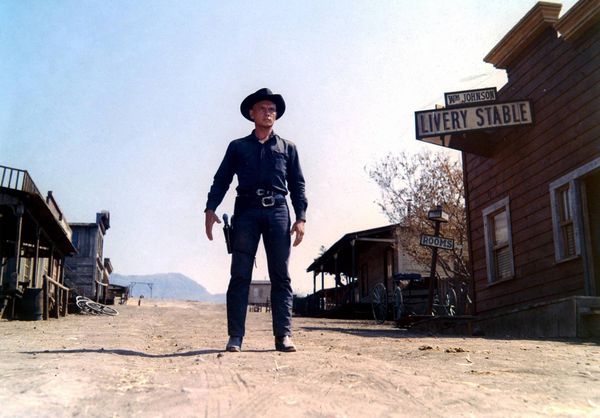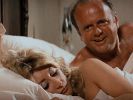Eye For Film >> Movies >> Westworld (1973) Film Review
Westworld
Reviewed by: Jennie Kermode

Sometimes fantasy and science fiction films provide more telling portraits of the times in which they were created than their realist counterparts do. Michael Crichton's first project as a screenwriter and director, Westworld was designed to work as a piece of blockbuster entertainment with a strong social critique at its core. It worked too well, the packaging so popular that many people missed what was inside; but at a distance, now that changing fashion has done its bit to rob both heroes and settings of their superficial appeal, it speaks more clearly as it was intended to, and its underlying complexity is undoubtedly a factor in its lingering cult appeal. That, and the iconic image of Yul Brynner astride a horse with a gun in his hand, the screen's first android who absolutely would not stop until you were dead.
Brynner's character, the Gunslinger, is an inhabitant of Westworld, one of three zones, along with Medieval World and Roman World, in the Delos adult fantasy theme park. Rich guests visit the park to indulge their desire for adventure or pampering. The androids are there to serve them and make their fantasies seem real, whether they want to come out unscathed from a bar-room brawl or take sexual advantage of a coy serving wench. We follow John (James Brolin), who has been before, and Peter (Richard Benjamin), a newcomer, as they live out their childhood wishes, two cowboys in a Wild West town straight out of Gunsmoke or Bonanza. But the Gunslinger becomes curiously fixated on Peter and seems to be drifting out of step with his programmed routine.

Written not long after the novel that inspired Logan's Run, which explores the way a group of young people left to their own devices let their desires run wild, Westworld goes to some very dark places even before the androids become dangerous, but it does so in a way that's easily overlooked by viewers who identify with the amicable heroes and enjoy the ride. Like the aforementioned novel, it reveals how easily things can go to extremes, but adds an awareness that at the heart of most of the visitors' desires is power fantasy - the desire, one way or another, to defeat or exploit others. Each of these dreamworlds is only possible at the expense of other people, and replacing suffering humans with androids only goes so far in salvaging those who abuse them; in another time, another place, they might not think of their servants or slaves as fully human either. The trick Crichton pulls off is to make it all jolly good fun until the tables turn, and thereafter to keep us on the side of the desperate visitors out of fear for them, though many viewers will find themselves increasingly sympathetic to the androids as they begin to rebel. As Alice Sheldon once said, it is partly fighting back that bequeaths the status of person.
Why do they rebel? This is put down to a computer virus, an idea only just beginning to be talked about in the real world when the film was made, making it one of perhaps a dozen films in total that have ever managed to look ahead at computing and get the details right. In another first for cinema (and another parallel with The Terminator, it is also explained that some of the computers were designed by other computers, hinting at a singularity with implications for the wider world. Crichton is alert to the easy sentiment connected with this, however; in a crucial scene, a king and queen who have completed the slaughter of the humans in their palace ascend their thrones and simply stop. It's not just a matter of running out of power; it's that they have reached the only goal they have ever been given, and lack the imagination to want anything beyond it. Theirs is not a brave new world of robot pioneers; it is cold and dead.
As the heroes, Benjamin and Brolin turn in perfectly judged performances which provide the ideal counterpoint to this. Peter and John's immense privilege - both over the androids and, it is implied, over other humans, or they could not have afforded the visit - is something they are utterly blind to, giving them a kind of innocence as well as an aching vulnerability. In this playground, they are little more than children, as lost as the empowered androids. God has abandoned them. There is no adult to run to. The only salvation lies in accepting the responsibility that comes from having set themselves up in godlike roles. To do so, they will need to run and fight like animals.
Reviewed on: 05 Aug 2015
















